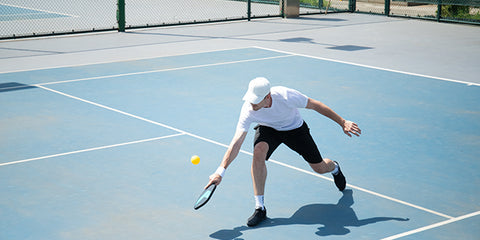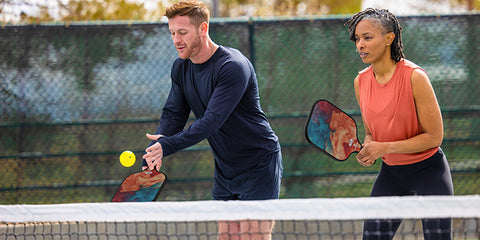The choice of core thickness is important. Even the pickleball paddles are made with the same specs. But the core thickness changes. It can have a big impact on how you play. Core thickness is usually measureZzd in millimeters (mm). One thing to keep in mind is that many companies do not publish core thickness or publish inches/fractions. That might make it even more confusing.
13mm and below

When you buy a racquet that's 13mm or under, it's because you want more power. These racquets feel stiffer when the ball hits the racquet. Because it's thinner it doesn't absorb as much energy so the ball falls faster. These are usually used by those who want to play faster, finish games faster, or if you can't generate enough power yourself. In general, thinner blades are slightly less forgiving than thicker blades. Thinner racquets are great for solo play. Because you use more drives to overtake your opponents.
13mm and 16mm are the standard thickness for most pickleball set. We've seen 14mm and 15mm paddles attempt to bridge the gap between thin core and thick core props. For some, these are the perfect combination. But typically you'll see premium paddles in 13mm and 16mm sizes. Examples of these are Franklin Signature, CRBN1, and Engage. There are 6.0 and non-6.0 versions. 6.0 is a 16mm paddle, not 6.0 is 13mm.
Some paddles are as thin as 9mm and as thick as 20mm. I've found through trial and error that thinner paddles tend to produce more vibration and poorer off-center performance. The biggest downside I find compared to thick spatulas though is that when you're using a soft Franklin X-40 with a thick paddle on a hot day, it's sometimes hard to finish a spot.
What should you choose?

Core thickness is a personal choice. For myself I always turn to thicker spatulas. Because I found that I couldn't place, reset or sink well with a thin spatula. All my shots bounced too much because my hands weren't soft enough to catch them. I still haven't found that I'm putting a lot of power into the game. So the extra power of the thin paddle is of little use to me. It all comes down to knowing you like playing light games. Or maybe more kidding? Softer gamers tend to move to thicker racquets. And softer players tend to use thinner racquets.
The best advice I can give is if you are a new player around 3.5 I tend to tell you to go for a thicker racquet. Soft play is often the thing that beginners and intermediate players struggle with the most. So having a racquet that helps you hit the ball more easily is very helpful. Bonus points if you find the paddles too thick and want more power. You can always attach a lead strap to power the paddle.
Final note These are guidelines, not fixed rules. I've played with thinner pickleball racquets that were more of a control-centric racquet. And I also use a thicker spatula which is more powerful than normal thick spatula. But on average, thicker means more control. Thinner means more strength.


